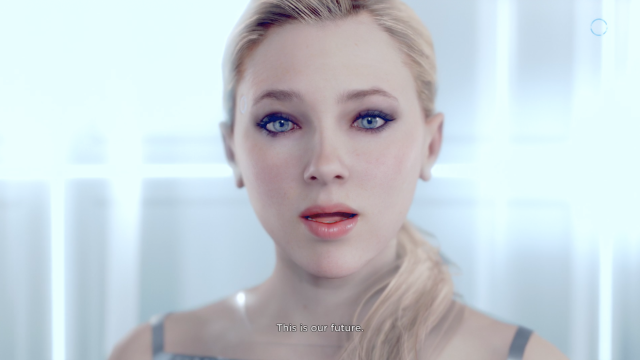A moment from the set-up sequence of Detroit: Become HumanScreenshot: Sony Interactive Entertainment
The concerns at the heart of Detroit: Become Human are readily apparent almost from the very start: the existential crisis faced by androids that look and behave like people but are treated like things. But its lofty ambitions get hamstrung at the very start by some incredibly heavy-handed moments of shlock.
David Cage makes video games that want to be movies. In a keynote address to fellow game-makers, he’s said that the video game medium needs to grow up. Every title put forth by his development studio Quantic Dream have been mood-intensive, character-driven stories that eschew the prioritisation of moment-to-moment violence so typical in most video games.
Indigo Prophecy, Heavy Rain, and Beyond: Two Souls all had players controlling characters who moved through mundane tasks into high drama. The studio tends to put the player in control of small, everyday interactions, the idea being that you more fully inhabit a character and invest in the drama as a result. When this design execution works, you get standout sequences like the tense hide-and-seek in Heavy Rain‘s Taxidermist DLC. When it doesn’t, you get infamous joke fodder like “Press X to Jason.”
Detroit starts out with a series of vignettes that cycle through three main android characters, opening with high-stakes drama first. Players first meet Connor (Bryan Dechart), a special police operative tasked with tracking down deviants, androids who go off protocol and pose a danger to humans. The first sequence is a hostage negotiation where a distraught android threatens to kill a little girl he once took care of. It’s a good primer for the gameplay that follows because it’s heavy-handed to a fault and borrows heavily from familiar tropes in cop-drama movies and TV shows.
From there, we meet Markus (Jesse Williams), who starts off as the assistant to an ailing artist but then becomes a leader in the android resistance movement. Finally, there’s Kara (Valorie Curry), who works as a housekeeper/babysitter but breaks her programming to go on the run with her young charge.
We’re supposed to care for these almost-humans but we meet them as overly familiar symbols first. Connor is the android hunting down his own kind, with an initial hostage crisis that leave another android dead. What’s supposed to feel like moral ambiguity instead comes across as cold and unfeeling pragmatism.
Markus gets yelled at by a preacher, only to be then beaten by a crowd of anti-android protestors. If that wasn’t enough, when he gets on public transit to go back home, he has to sit on the back of the bus, in a segregated android compartment.
Cage has waffled when asked about any political messaging to be taken away from his games, but it feels disingenuous to put a character strongly coded as a second-class citizen in the back of a bus and then say you “[don’t] want to provide a message to mankind with this game.” Doing so cheapens both the artistic endeavour and the historical events it invokes.
In the first sequence where you encounter Kara, she’s sold as an appliance. When she enters the home of her owner Todd, she treated like as a fusion of robot vacuum and scullery maid.
She has to try and win over Todd’s daughter, who’s upset by Kara’s very presence. Kara also gets dismissiveness and verbal abuse flung at her from Todd, all with the aim of making players sympathize with her. But any sympathy resulting from these interactions feels programmatic and unearned.
The touches of world-building peppered throughout the game don’t do anything to add weight or stakes to the proceedings either. Real-world tech-ethics controversies get copy-pasted into Detroit‘s fiction in eye-rollingly facile ways, like sponsored content that says hetero men prefer sex with androids, news reports on exodus from flooding coastal cities, and articles that report androids may be listening into owners’ conversations and harvesting data for advertisers. For the most part, it doesn’t seem like most people in the world of Detroit actually cares about these matters. They’re just there for the player to find so the game’s creators can check off a box on a ‘Deep Commentary’ checklist.
The biggest problem with how Detroit starts is that you can’t detect a heartbeat anywhere in the game’s opening hours. Detroit mostly stumbles through an odd dance of performative philosophizing and none of the characters feel lived in enough for you to care about what happens to them next. They’re cypher vessels made to hold trite observations about human nature. For example, when Markus’ owner Karl asks him to paint, both the android’s naive flustered response and the artist’s kindly encouragement come across as pretentious and condescending, because Markus only has whatever humanity Karl or others grant him.
Within the span of a few chapters, we see Markus beaten up, vilified as a demon, and urged to find his inner creative soul. None of it feels earned. I know there’s a revolution waiting to ignite in Detroit: Become Human and that’s likely where the game’s best moments may lie. But nothing in the game’s soggy beginning feels capable of sparking a heated desire to see any more of its world.
